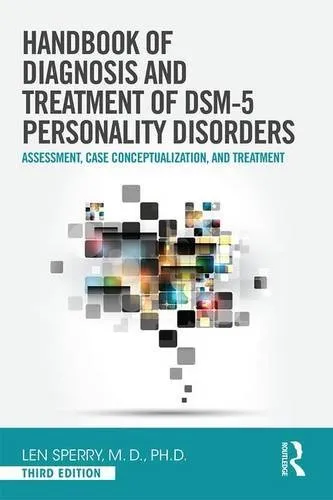Handbook of Diagnosis and Treatment of DSM-5 Personality Disorders: Assessment, Case Conceptualization, and Treatment
4.8
Reviews from our users

You Can Ask your questions from this book's AI after Login
Each download or ask from book AI costs 2 points. To earn more free points, please visit the Points Guide Page and complete some valuable actions.Introduction to the Handbook
The "Handbook of Diagnosis and Treatment of DSM-5 Personality Disorders: Assessment, Case Conceptualization, and Treatment" serves as a comprehensive resource for clinicians, therapists, mental health professionals, and students who aim to deepen their understanding of personality disorders as outlined in the DSM-5. It is both a practical guide and a theoretical exploration, blending evidence-based practices with insights gained from clinical expertise.
Personality disorders are among the most complex and challenging conditions to diagnose and treat, given their pervasive influence on individuals' lives and relationships. This handbook offers a clear roadmap to navigate this complexity, emphasizing the integration of the DSM-5 diagnostic framework with individualized case conceptualization and targeted treatment strategies. By focusing on actionable interventions and case-based examples, the book equips readers with tools to address a wide range of client needs effectively.
Detailed Summary of the Book
This book is structured into three essential parts: assessment, case conceptualization, and treatment.
The first section focuses on the robust assessment of personality disorders. It delves into diagnostic criteria as described in the DSM-5, offering clarity in distinguishing specific disorders from other mental health conditions. The book outlines various assessment tools, structured interviews, and self-report questionnaires while discussing the importance of considering cultural and contextual factors in diagnosis.
The second section on case conceptualization emphasizes a person-centered approach. It offers a systematic framework to understand how personality traits, biopsychosocial factors, and life history interact to maintain disordered patterns. This part bridges the gap between diagnosis and intervention, helping clinicians create tailored treatment plans grounded in a thorough understanding of their clients.
The third section provides detailed treatment strategies for each DSM-5 personality disorder. Evidence-based approaches, including cognitive-behavioral therapy (CBT), dialectical behavior therapy (DBT), schema-focused therapy, and psychodynamic therapy, are discussed extensively. The book also highlights the importance of therapeutic alliance, addressing therapist challenges, and managing resistance during treatment.
Together, the three sections form a cohesive guide that seamlessly integrates theory, research, and practical application in the complex domain of personality disorders.
Key Takeaways
- Comprehensive coverage of assessment and diagnostic procedures for DSM-5 personality disorders.
- In-depth exploration of case conceptualization strategies rooted in the biopsychosocial model.
- Tailored treatment interventions for each personality disorder, based on the latest evidence-based practices.
- Practical guidance on overcoming common therapeutic challenges, such as resistance and countertransference.
- Inclusion of case studies and clinical examples to enhance understanding and application.
Famous Quotes from the Book
"Personality disorders represent not just patterns of thought and behavior that deviate from societal norms, but deeply ingrained and rigid ways of interacting with the world, shaped by a lifetime of experiences."
"Successful treatment involves not merely symptom reduction, but helping clients reconfigure their deeply rooted beliefs and relational patterns."
"The therapeutic alliance is not just important – it is essential. Trust and collaboration lay the groundwork for meaningful change in personality disorders."
Why This Book Matters
Understanding and addressing personality disorders is a critical aspect of mental health practice, yet it is often fraught with challenges. This handbook offers a balanced approach, combining the structural clarity of the DSM-5 with the flexibility essential for effective case conceptualization and treatment.
What sets this book apart is its ability to distill complex concepts into actionable steps, making it an indispensable resource for both seasoned professionals and those new to working with personality disorders. Its emphasis on evidence-based strategies ensures that readers are equipped with tools that are proven to be effective in clinical settings.
Moreover, the inclusion of real-world case studies brings the theoretical material to life, offering relatable and practical insights. The focus on the therapeutic alliance underscores the human aspect of treatment, reminding us that empathy and understanding are at the heart of effective care.
This book matters because it equips clinicians to not only diagnose and treat but also to make a profound and lasting impact on their clients' lives.
Free Direct Download
You Can Download this book after Login
Accessing books through legal platforms and public libraries not only supports the rights of authors and publishers but also contributes to the sustainability of reading culture. Before downloading, please take a moment to consider these options.
Find this book on other platforms:
WorldCat helps you find books in libraries worldwide.
See ratings, reviews, and discussions on Goodreads.
Find and buy rare or used books on AbeBooks.


